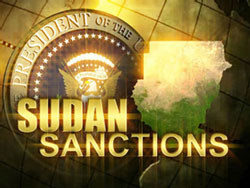ASKIAM
Senior Correspondent
Bush imposes pre-emptive sanctions on the Sudan

WASHINGTON (FinalCall.com) – Hostility toward the government of the Sudan by the U.S. and other Western nations only serves to extend the armed conflict and prolong the humanitarian suffering in Darfur, Sudan’s Foreign Minister told reporters at the National Press Club here, in a satellite video conference from Khartoum June 6.
“The biggest harm from the sanctions, is to the political process itself, because it is a political process that will end all the suffering, all the problems that are being experienced in Darfur now,” said Dr. Lam Akol, Minister of Foreign Affairs, in response to a reporter’s question.
“The insecurity, the question of excesses that are being committed in Darfur, there is no doubt in a war situation the rule of law suffers; human rights are affected. And therefore, the only way to stop all this is to bring the war to an end. The first casualty of these sanctions, coming at the time they did, was the peace process,” said Dr. Akol.
Just days earlier, President George W. Bush increased U.S. sanctions against Sudan, barring 31 companies, including oil exporters from trade and financial dealings with the U.S. The newly sanctioned companies join 132 other Sudanese firms already banned from doing business with any U.S. company or bank.
“I held off implementing these steps because the United Nations believed that Pres. [Omar] al-Bashir could meet his obligations to stop the killing. Unfortunately, he hasn’t met those obligations,” Pres. Bush said in the White House Diplomatic Reception Room May 29.
“We’re isolating these persons by cutting them off from the U.S. financial system, barring them from doing business with any American citizen or company, and calling the world’s attention to their crimes.” The White House announcement came on the eve of critical discussions on the final phase details of the joint African Union-United Nations peacekeeping force to be deployed in the region.
“What message are you sending to the rest of the world?” asked Dr. Akol. “You are saying that, ‘No. This [peace negotiations] must be stopped. There is another course of action to be followed.’ You are definitely scuttling all the efforts that are meant to bring about a peaceful resolution of the problem in Darfur, because peacekeeping is definitely tied to the achievement of peace itself. If there is no peace, there is nothing to keep.”
The one-sided public debate about sanctions against the Sudan because of conditions in Darfur, “creates confusion that obstructs the efforts of the international community for finding a peaceful solution” for Darfur, the Sudanese official argued.
Ironically, the number of rebel groups in Darfur is actually increasing, as some of the groups splinter, making a peace agreement more difficult, according to published reports quoting Jan Eliasson the chief UN envoy in Darfur. In May, there were nine opposition movements. By early June, Mr. Eliasson said, there were 12, and that number could increase. “They are fragmenting further, and that is, of course, great difficulty, not only politically, but physically and logistically,” he told reporters after a closed-door briefing to the UN Security Council.
In order for a peace plan now on the table to be successful, it must be approved by both the UN Security Council, and the African Union’s Peace and Security Committee. Sudanese delegates were meeting with their AU and UN counterparts in Addis Ababa to agree on the final details of that agreement at Final Call press time.
“It is now the duty of the UN to pass a resolution to fund this [peacekeeping] operation,” Dr. Akol pointed out.
“I was a rebel myself before the Abuja agreement two years ago,” he explained of his role in the decades-long Sudanese North-South civil war.
“I used to take pride in being called a rebel,” he continued, pointing out that rebel groups today are making peace more difficult to achieve in Darfur because they keep pressing for greater concessions from Khartoum.
“The most obvious reason for the present impasse in Darfur and the continued fighting, which eventually results in further suffering of the people, the main reason for that is the fact that some people have decided to continue fighting in Darfur, despite the fact that there is a peace agreement in place,” said Dr. Akol. “They have been intransigent, in all attempts to see that peace [is achieved] in Darfur. So, any more pressure you put on the Sudan government, will be read to be support for them.”
Many civilians in Darfur have been killed, and tens of thousands more displaced since tribal clashes and an anti-government rebellion erupted in the area in February 2003.
Related links:
Graphical Image: Sudan Regional Map
Despite U.S. threat of sanctions, Sudan demands African Union peacekeeping force (FCN, 05-15-2007)
U.S. Black media delegation returns from Darfur (FCN, 05-15-2007)
Sudanese president answers questions on Darfur (FCN, 05-14-2007)
Darfur, Uganda and the U.S. campaign to destabilize Sudan (FCN, 01-01-2007)
Qadhafi: Oil is behind Darfur, Sudan crisis (FCN, 12-08-2006)
Darfur, Sudan: Seeking the Truth (WEBCAST: Minister Louis Farrakhan, 05-07-2006)
Reconnecting the international struggles of Black people (Min. Louis Farrakhan/FCN, 05-07-2006)
FCN Editorial – Clear the cloud of confusion over Sudanese conflict (02-10-2005)
Sudan needs help, not sanctions – A report from Darfur (FCN, 09-23-2004)
How the U.S. Government destabilized foreign governments (FCN, 07-22-1985)












